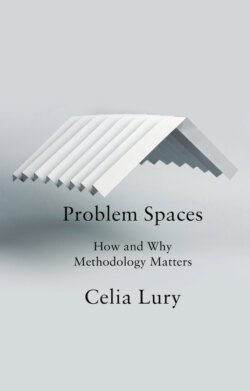Читать книгу Problem Spaces - Celia Lury - Страница 20
Approach 4: Jullien
ОглавлениеThe fourth approach introduced here is not that of the French author François Jullien himself but is, rather, his account of the Chinese concept of shi, sometimes translated as potential, a set-up, disposition, position or circumstance.
Jullien (2004) describes shi as ‘a tendency that stems from a situation’ and ‘which, once set off, cannot be arrested’. (In my use of Whitehead’s vocabulary, it is compulsive.) Jullien observes that the concept of shi initially emerged in the realm of Chinese military strategy and politics but evolved to have a much broader philosophical meaning. He explicitly contrasts it with the Western practice of fixing one’s eyes on a model, a practice in which, he suggests, efficacy is conceived in terms of abstract, ideal forms, set up to be projected onto the world as a goal to be attained. In contradistinction, shi is associated with a concept of efficacy that ‘teaches one to learn how to allow an effect to come about: not to aim for it (directly) but to implicate it (as a consequence), in other words, not to seek it, but simply to welcome it – to allow it to result’ (2004: vii).
Jullien’s focus on shi as propensity allows him to reconfigure traditional Western philosophical concerns: ‘the fact is that, beneath the question of efficacy, another gradually surfaces: not the question of being and knowing, which is constantly raised by metaphysics, nor that of action, which is its ethical corollary, but the question of the conditions of effectiveness’ (2004: viii). He continues:
To move on from the question of efficacy, which still bears the imprint of voluntarism, to that of efficiency, which implies an underlying fund of immanence, we need to attempt a shift. A shift in two senses of the term: a shift away from our normal thinking habits, a move from one framework to another – from Europe to China and back again – which will undermine our representations and get our thoughts moving; and also a shift in the sense of shifting the impediment that is preventing us from perceiving what we have always blocked out of our thinking and, for that very reason, have been unable to think about. (2004: viii)
This is a point of difference with Dewey, whose ethics of thought is also concerned with efficacy. As Stengers summarizes, while for Dewey, the ‘question of the truth … is not situated in the true/false alternative, but poses the question of its efficacy’, she also notes that this efficacy is understood in terms of ‘its possible power of breaking through indifference and of engaging and obliging one to choose’ (2009: 10). However, in acknowledging Dewey’s use of the term ‘choice’ she distinguishes his understanding from that of rational choice and adds, ‘It is no longer a worldly choice – what should one choose to be or do in this world? – but a choice for the world to which it is a matter of contributing. This choice doesn’t only imply a world in the making; it affirms a world whose components are themselves indeterminate, whose ‘perfectibility’ depends on the jumper’s trust that he may connect with ‘other parts’ that may become an ingredient in its fabric’ (2009: 11).
In Jullien’s understanding of Chinese thought, context or circumstances are no longer something unpredictable, to be controlled, eliminated or excluded in experimental conditions. Instead, because of their variability, circumstances can be turned to advantage by the propensity emanating from the situation. Jullien writes:
Now circumstances are no longer conceived only (indeed, at all) as “that which surrounds” (circumstare), that is to say, as accessories or details (accompanying that which is essential in the situation or happening – in keeping with a metaphysics of essence). Instead, it is through those very circumstances that potential is released, the potential, precisely, of the situation. (2004: 22)
Within this antagonistic process there is constant interaction: ‘“the potential of the situation is whatever profits from that which is variable”’ (Wang Xi, quoted in Jullien 2004: 22). Jullien concludes:
The whole of Chinese thought about efficacy reverts to a single act: that of “returning” to the fundamental “basis,” that is to say, the starting point of something that, as a condition, subsequently carried forward by the evolution of things, will gradually impose sway of its own accord. In such circumstances, an effect is not merely probable, as it is in a constructed relation of means to an end, but will unfailingly result, spontaneously. (2004: 45)
As he concludes, the ‘way’ (the dao), as conceived traditionally in China, ‘is a far cry indeed from our Western method (methodos, which is a “way” to be “pursued” that leads “toward” something)’ (2004: 33).
